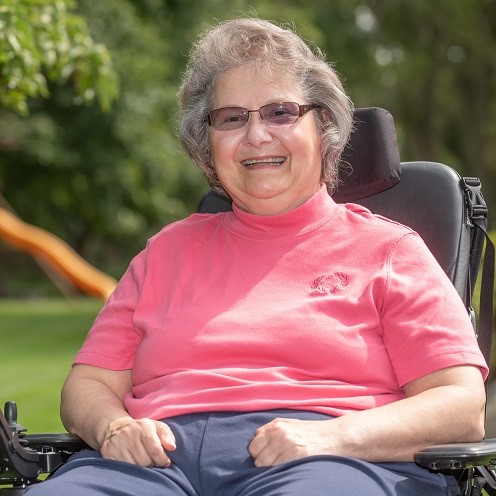Living with ALS
A long-time survivor, Laura shares details of her diagnosis and journey with ALS.
At Henry Ford Health, our amyotrophic lateral sclerosis (ALS) experts treat you like a member of our family. Our commitment to delivering high-quality care has earned our program top honors from the ALS Association. We build lasting relationships with patients, so you can count on us for the right treatments and support as your needs change.

A long-time survivor, Laura shares details of her diagnosis and journey with ALS.
ALS, also known as Lou Gehrig’s disease, is a group of conditions that occur when cells called motor neurons break down. These cells help control movement in your arms, legs and chest, including muscles that help you breathe and swallow. ALS symptoms get worse over time, eventually making it difficult or impossible to move certain muscles.
Treatments may slow the progression of ALS and help you cope with changes to daily life. Coming to an experienced program like ours means you receive the attention you need and tailored services at every turn.
Receiving treatment at a nationally recognized program, such as the one at Henry Ford, improves survival and quality of life. It also eases stress and brings peace of mind to family caregivers.
Our experts spend time getting to know you, listening carefully as you explain how ALS symptoms affect your life. After a thorough assessment, we use a team approach to deliver the services that best meet your needs.
Highlights of our program include:
An ALS diagnosis brings changes to your life and the lives of your loved ones. We offer ongoing support services to make this transition a little less stressful. Our caring specialists answer your questions and refer you to helpful community resources. Explore our C.A.R.E. Program.
The symptoms of ALS include:
There is no single test to confirm ALS. Doctors make the diagnosis using different types of evaluations, including tests that help rule out other neurodegenerative disorders. We start with a complete medical history. Specialists also perform a neurologic exam to assess muscle strength, coordination and reflexes. This exam helps us determine which additional tests you may need.
Your evaluation may include:
Your personalized treatment plan may include:
We use cookies to improve your website experience. By using this site, you agree to our Terms of Use. Read our Internet Privacy Statement to learn what information we collect and how we use it.